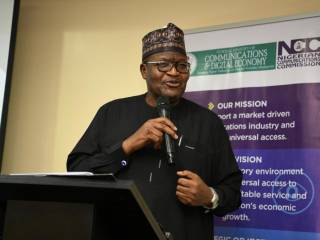PAG Felicitates Muslims on Commencement of Ramadan Fast
February 18, 2026TOP TEN MUSLIM UNIVERSITIES IN AFRICA
February 14, 2026ANALYSIS: Why Nigeria GDP is not the best in Africa Despite having the largest market
February 10, 2026Telecoms Investment in Nigeria stands at $75.6bn as sector adds N10.126 trillion to GDP in 2022
Telecoms Investment in Nigeria stands at $75.6bn as sector adds N10.126 trillion to GDP in 2022

The investment profile in Nigeria’s telecommunications sector, comprising foreign direct investment (FDI) and local investment, has reached $75.6 billion as of 2021.
The Executive Vice Chairman of the Nigerian Communications Commission NCC, Professor. Umar Garba Danbatta, disclosed this at an interactive session with the Information Communication Technology ICT/ Business Editors in Lagos where he rolled out his scorecards and landmark achievements that have shaped the trajectory of growth in the telecoms sector since he assumed office in August 2015.
Danbatta noted that in 2018, investment profile in the sector stood at $68 billion. This jumped to $70.5 billion in 2019 and $72 billion in 2020.
At the end of 2021, the figure rose to ($75.6 billion) and the latest figure is the current official investment profile computed in the industry up from the initial $70 billion investment in the last few years.
Investment in the telecommunications sector in Nigeria is computed from two sources: the Central Bank of Nigeria (CBN), and the financial data obtained from service providers by the Commission.
While the CBN collects and calculates an element of the telecoms sector to include FDI, portfolio and others, the Commission collects investment figures from telecom licensees described as domestic investment arising from capital expenditure (CAPEX) which form part of the total investment in the industry.
Professor Danbatta stated that thanks to the Commission’s effective regulatory framework, the telecom sector has grown tremendously from an initial investment profile of $500 million in 2001, when the sector was fully liberalised.
He also strewed that the telecom sector has remained a major contributor to the Nigerian economy, with the sectoral contribution to the nation’s Gross Domestic Product (GDP) increasing from about 8.5 percent in the third quarter of 2015 to N10.126 trillion in 2022 alone.
Citing data from the National Bureau of Statistics (NBS), Professor Danbatta explained that the telecoms sector contributed N10.126 trillion as an aggregate quarterly contribution to GDP in 2022 as Telecoms contribution to national GDP has grown significantly since his assumption as EVC of NCC in August, 2015, according to available data from NBS.
According to the NCC head, the industry has become a major enabler of economic development in the country, positively impacting all aspects of the economy.
Professor Danbatta further stated that as of May 2023, active voice subscriptions had reached 221.3 million, representing 115.91 percent teledensity, while Internet subscribers had increased to 159.6 million.
Broadband subscriptions on Third Generation (3G) and Fourth Generation (4G) networks increased to 92.2 million, representing a 48.28 per cent broadband penetration in the country.
Also, following the issuance of 3.5GHz spectrum licences for the deployment of Fifth Generation (5G) networks in Nigeria, marked by ultra-high speed internet, low latency and high capacity, and the subsequent commercial launch by two of the three licence holders, 5G subscriptions have grown to over 60,000 in many cities in at least 12 states of the Federation.
Professor Danbatta assured the Commission’s commitment to always give concrete expression to the Federal Government Executive Order 001 focused on Ease of Doing Business and other digital economy-oriented policies, by embarking on various regulatory initiatives that support a friendly investment climate in Nigeria and enhance value for money for telecom consumers.
The EVC also praised the media for serving as a strategic partner and enabler of growth in the telecom sector by providing accurate, appropriate, and timely reporting on the Commission’s regulatory actions.








